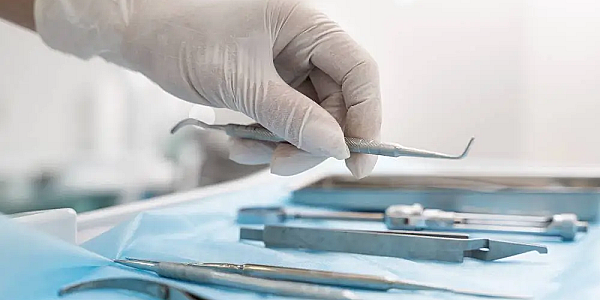We dispel myths about tooth extraction: what are the prices and how is the post-extraction period
Dental surgery is a field that no longer has to scare us in 2023. Dental offers are friendly and bring to light modern, painless and non-invasive technologies.
One of the most common myths when we talk about this topic is that tooth extraction hurts and cannot be avoided.
In fact, extraction is only resorted to if periodontal diseases have destroyed too much of the tooth, so that it cannot be restored, as for the pain – modern methods of anesthesia are extremely effective! At DentArbre Dental Clinic, we perform both regular and "surgical" extractions (in the case of wisdom teeth included). Dental extraction refers to: extractions with alveolotomy and alveoloplasty, surgical extraction of permanent teeth, included and semi-included molar extractions (extraction of wisdom teeth).
Most dental clinics offer a wide range of dental prophylaxis and treatment services that would prevent a surgical pulp extraction. Today, dental surgery pays special attention to the methods of preservation and restoration of teeth, which include the removal of all types of infections and their effective treatment. However, the most common surgical intervention is tooth extraction, especially of teeth affected by periodontal disease and tooth extraction with infection. Patients say that one of the most unpleasant procedures is the surgical extraction for the brain mass. However, in a respectable dental clinic, tooth extraction is performed in extremely comfortable conditions, using high-quality painkillers, and this procedure becomes completely painless.
Indications for tooth extraction
When is it time to go to a dental clinic in Bucharest for a tooth extraction?! Fear and prejudice keep us away from the doctor, although we must be aware of the need for such an intervention in the following situations:
When there are teeth with extensive corona-radicular damage, which can no longer be restored with the help of fillings or prosthetic means; Teeth with complicated gangrene with chronic apical periodontitis; Molars that have determined suppurative complications, for which conservative treatment methods are not indicated ; Teeth and molars which, following chronic local irritation, have led to the appearance of reactive, inflammatory hyperplastic lesions; Fractured or completely dislocated teeth as a result of trauma.
The extraction of wisdom teeth is necessary because, most of the time, the wisdom teeth have a vicious position that does not allow them to fully erupt, or if they remain partially covered by the gum, they can decay and cause terrible pain. So, surgical intervention is necessary.
When there is too much damage for the tooth to be repaired, it must be extracted. For orthodontic patients, the decision to remove molars or not can be postponed until the end of orthodontic treatment, except in situations where the removal of a molar is mandatory from the beginning of treatment. Dental offers are discussed with the doctor following a thorough examination.
What are the indications and post-extraction care methods?
Surgical mass removal generally causes more pain after the procedure than regular treatment. The level of discomfort and how long the pain is felt depends on how difficult that tooth extraction was – an infection or a routine one. Healing time is different from person to person. You can expect discomfort even after a regular tooth extraction without suppurative complications in the preoperative history. If blood clots are dislodged from the surface of the wound or if the wound becomes infected over time, the recovery period may be longer. The first 24 hours after the extraction are the most important and can significantly contribute to the healing process. In the first two hours after extraction, the operated area may bleed and it is necessary to apply sterile compresses. Clot formation in the alveolus must be preserved, therefore avoid hot, cold foods and copious rinsing. The tissue healing process takes 3-4 weeks, but the bone healing process takes up to 6 months.
After a dental extraction it is recommended:
Maintaining the supraalveolar dressing for two hours; Semi-liquid diet, at room temperature on the day of the intervention; Chewing food on the side opposite the post-extraction wound; Avoiding rinsing the mouth and consuming carbonated drinks in the first days after the extraction; Using for oral hygiene some antiseptic solutions/sprays based on chlorhexidine, after the critical period; Brushing is not performed in the first 24 hours after mass extraction - with or without infection; Antibiotic protection is necessary in complex cases (laborious alveolotomies, with significant loss of bone substance; after multiple extractions); Smoking is prohibited for the first 24 hours to preserve the natural healing process.
The patient will also be warned about the phenomena inherent in the post-extraction inflammatory reaction:
Pain; Postoperative edema, which can last several days; Ecchymoses of the oral mucosa and cervico-facial skin.
What happens if the wisdom teeth are not extracted?
Statistics say that wisdom teeth appear in 75% of the population at the age of 17-25 years. The biggest problem is that all the teeth are already formed and we don't have room for these teeth. The lack of space in the jaw is explained by the fact that in the process of human evolution, eating became easier with the thermal processing of food, so the chewing load decreased, which led to the shrinking of the jaw. In modern man, the jaw has shrunk by 10 mm. The presence or absence of wisdom teeth depends on a lot of factors. When the wisdom tooth erupts, the gums become inflamed. If the molars erupt in a vicious position and cannot be properly cleaned, they quickly decay and can even affect the nerve. In such situations, surgical extraction becomes necessary – the brain mass is removed.
If tooth extraction does not occur, severe inflammatory processes occur. Mind meal can cause pain and fever. A recent study shows that dentists recommend the extraction of wisdom teeth in 59% of patients, mainly to prevent future problems or because of malposition and orientation.
Surgical extraction of wisdom tooth - prices
The price for the extraction of wisdom teeth varies depending on the difficulty. The intervention usually takes place under optimal conditions, the anesthesia is partial, to create a comfortable working environment for both the patient and the operating doctor. Despite the characteristics of each individual as a whole, namely: pain threshold, sensitivity, suspicion, most types of (surgical) pulp extraction are painless (or should be, if you find a good dentist).
Updated prices for 2023 can be consulted here.


